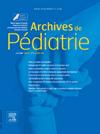Vaginal screening for group B streptococcus using PCR in pregnant women with unknown colonization status: Impact on newborn monitoring for early-onset sepsis
IF 1.3
4区 医学
Q3 PEDIATRICS
引用次数: 0
Abstract
Background
Early-onset neonatal sepsis represents a diagnostic challenge, as it is a cause of neonatal mortality and morbidity. Guidelines for the prevention of group B streptococcus (GBS) infection recommend that all pregnant women must be screened for GBS carriage at the end of pregnancy, with intrapartum antibiotic prophylaxis being provided for GBS carriers. If vaginal culture is not available, GBS polymerase chain reaction (GBS-PCR) is an alternative option for this type of screening. In our unit, GBS-PCR is performed when pregnant women present to the delivery room with ongoing labor and with no results of culture GBS screening available. The main objective of this study was to evaluate the impact of the results of GBS-PCR on monitoring modifications in newborns of mothers with unknown GBS status. The secondary objectives were to confirm the feasibility of a GBS-PCR-based screening method in everyday practice and to evaluate the impact of GBS-PCR results on the modification of intrapartum antibiotic therapy in pregnant women.
Method
A retrospective, single-center, observational study was conducted for 1 year. For dyads with GBS-PCR performed, changes concerning intrapartum antibiotic therapy and the newborn's monitoring were recorded. The feasibility of the method was evaluated by the delay between the GBS-PCR realization and the availability of the result; in addition, the number of GBS-PCR tests that could not be realized were collected.
Results
Overall, 60 GBS-PCR samples were tested for 60 pregnant women. Results were obtained for all samples, and the median duration to obtaining the GBS-PCR results was 70 min (60.8–87.2). These results were positive for 11 (18.3 %) women and led to monitoring modifications for two infants. In total, 27 pregnant women (45 %) had modifications in their antibiotic therapy due to the GBS-PCR results.
Conclusion
GBS-PCR was quickly available and the results led to changes in maternal antibiotic prophylaxis and in the monitoring level of the newborns.
使用 PCR 对定植状况不明的孕妇进行 B 群链球菌阴道筛查:对新生儿早期败血症监测的影响。
背景:早发型新生儿败血症是诊断方面的一项挑战,因为它是新生儿死亡和发病的原因之一。预防 B 组链球菌(GBS)感染的指南建议,所有孕妇必须在妊娠末期接受 GBS 携带者筛查,并为 GBS 携带者提供产前抗生素预防。如果无法进行阴道培养,GBS 聚合酶链反应(GBS-PCR)是此类筛查的另一种选择。在我们科室,当孕妇在分娩过程中进入产房,但没有获得 GBS 培养筛查结果时,就会进行 GBS-PCR 筛查。本研究的主要目的是评估 GBS-PCR 结果对 GBS 状态不明的母亲所生新生儿监测模式的影响。次要目标是确认基于 GBS-PCR 的筛查方法在日常实践中的可行性,并评估 GBS-PCR 结果对孕妇产前抗生素治疗调整的影响:方法:进行为期一年的回顾性单中心观察研究。对于进行了 GBS-PCR 检测的夫妇,记录了产前抗生素治疗和新生儿监护方面的变化。该方法的可行性通过 GBS-PCR 检测与结果获得之间的延迟时间进行评估;此外,还收集了无法进行 GBS-PCR 检测的数量:总共对 60 名孕妇的 60 份 GBS-PCR 样本进行了检测。所有样本都获得了结果,获得 GBS-PCR 结果的中位时间为 70 分钟(60.8-87.2 分钟)。有 11 名孕妇(18.3%)的检测结果呈阳性,并因此对两名婴儿的监测结果进行了调整。共有 27 名孕妇(45%)因 GBS-PCR 结果而调整了抗生素治疗:结论:GBS-PCR 可快速获得,其结果导致孕妇抗生素预防措施和新生儿监测水平的改变。
本文章由计算机程序翻译,如有差异,请以英文原文为准。
求助全文
约1分钟内获得全文
求助全文
来源期刊

Archives De Pediatrie
医学-小儿科
CiteScore
2.80
自引率
5.60%
发文量
106
审稿时长
24.1 weeks
期刊介绍:
Archives de Pédiatrie publishes in English original Research papers, Review articles, Short communications, Practice guidelines, Editorials and Letters in all fields relevant to pediatrics.
Eight issues of Archives de Pédiatrie are released annually, as well as supplementary and special editions to complete these regular issues.
All manuscripts submitted to the journal are subjected to peer review by international experts, and must:
Be written in excellent English, clear and easy to understand, precise and concise;
Bring new, interesting, valid information - and improve clinical care or guide future research;
Be solely the work of the author(s) stated;
Not have been previously published elsewhere and not be under consideration by another journal;
Be in accordance with the journal''s Guide for Authors'' instructions: manuscripts that fail to comply with these rules may be returned to the authors without being reviewed.
Under no circumstances does the journal guarantee publication before the editorial board makes its final decision.
Archives de Pédiatrie is the official publication of the French Society of Pediatrics.
 求助内容:
求助内容: 应助结果提醒方式:
应助结果提醒方式:


